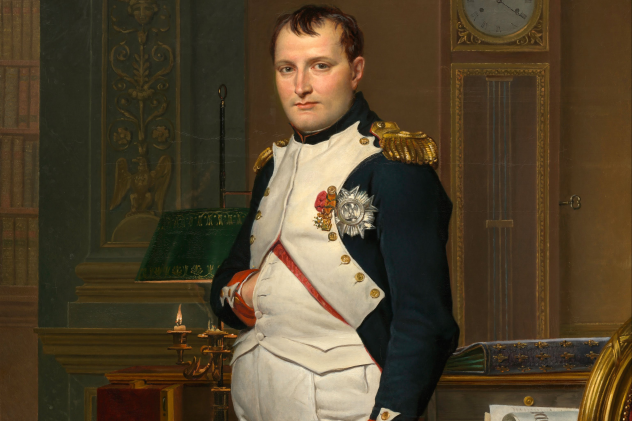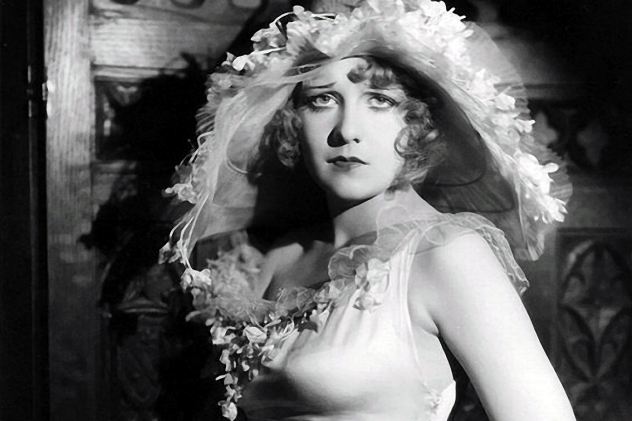 History
History  History
History  History
History 10 “Modern” Problems with Surprising Historical Analogs
 Health
Health 10 Everyday Activities That Secretly Alter Consciousness
 History
History Top 10 Historical Disasters Caused by Someone Calling in Sick
 Animals
Animals 10 New Shark Secrets That Recently Dropped
 Movies and TV
Movies and TV 10 Forgotten Realities of Early Live Television Broadcasts
 Technology
Technology 10 Stopgap Technologies That Became Industry Standards
 Weird Stuff
Weird Stuff 10 Wild Facts About Taxidermy That You Probably Didn’t Know
 Travel
Travel 10 Beautiful Travel Destinations (That Will Kill You)
 Miscellaneous
Miscellaneous 10 Modern Marriage Rituals Born from Corporate Branding
 History
History 10 Extreme Laws That Tried to Engineer Society
 History
History 10 “Modern” Problems with Surprising Historical Analogs
 Health
Health 10 Everyday Activities That Secretly Alter Consciousness
Who's Behind Listverse?

Jamie Frater
Head Editor
Jamie founded Listverse due to an insatiable desire to share fascinating, obscure, and bizarre facts. He has been a guest speaker on numerous national radio and television stations and is a five time published author.
More About Us History
History Top 10 Historical Disasters Caused by Someone Calling in Sick
 Animals
Animals 10 New Shark Secrets That Recently Dropped
 Movies and TV
Movies and TV 10 Forgotten Realities of Early Live Television Broadcasts
 Technology
Technology 10 Stopgap Technologies That Became Industry Standards
 Weird Stuff
Weird Stuff 10 Wild Facts About Taxidermy That You Probably Didn’t Know
 Travel
Travel 10 Beautiful Travel Destinations (That Will Kill You)
 Miscellaneous
Miscellaneous 10 Modern Marriage Rituals Born from Corporate Branding
10 Musicians And Performers Beloved By Dictators
Even murderous tyrants like music and performance. If you can impress someone with the political power of life and death, you can really improve your career—unless you get horribly killed for a bad show.
10 Johannes Heesters
Dutch-born German singer and actor Johannes Heesters was one of Nazi Germany’s most beloved entertainers, popular with both the masses and the Nazi party elite. His role was to boost troop morale and to create the illusion of happiness for the population in the midst of world war. He performed for Adolf Hitler as well as German troops, and most controversially, he’s been alleged to have performed for the guards at the concentration camp in Dachau. When Heesters starred in Hitler’s favorite operetta, The Merry Widow, the fuhrer described him as “the best Danilo I have ever seen.”
Heesters was never accused of propaganda after the war and remained popular as a cultural fixture in postwar Germany and Austria. However, his reputation in his Dutch homeland was dreadful. He was perceived as the jester for the Third Reich. During a 1964 Amsterdam appearance as Captain Von Trapp in The Sound of Music, he was forced to withdraw when protesters in the audience stood up and performed the Nazi salute.
Heesters was reportedly unhappy with this treatment. He wrote:
What did I do wrong? Sure, I acted in films in the Third Reich, entertainment films, which distracted countless people inside and outside Germany from daily life during war. Sure, I wanted to make my career and I remember well at the time how many people in the Netherlands were proud that I made a career in the huge neighbouring country. But apart from my career—and the fact that, through no fault of my own, Adolf Hitler was one of the fans of my art—what have I done?
Still, he didn’t make many friends when he referred to the compound at Dachau as a “typical barracks” in 1978, despite its key role in the Holocaust. In a 2008 interview on Dutch television, Heesters called Hitler “a good guy.” His wife intervened to remind him that Hitler was the worst criminal in history, to which Heester replied, “I know, doll. But he was nice to me.”
9 Napoleon’s Composers

Napoleon Bonaparte loved music, which he believed was that “which exercises the greatest influence upon the passions, and is the one which the legislator should most encourage.” He hated English and French music, though, and believed that only Italians could produce good opera. His favorite composer was Giovanni Paisiello, whom he invited to Paris in 1801 to compose and conduct for his private orchestra. Paiseillo was initially reluctant to leave his native Naples but was finally convinced in order to improve French-Neapolitan relations. While in Paris, he produced one opera, Proserpine, which pleased Napoleon but left the Parisian public cold. Paisiello used his wife’s inability to cope with the climate as an excuse to return to Naples, though he composed for Napoleon’s coronation and continued to send the French leader a “sacred composition” for each birthday.
Another Italian composer who had a major career boost thanks to Napoleon was Gaspare Spontini, who had become known for his controversial libretto La Vestale, the story of a romantic relationship between a virgin and a high-ranking military man. Napoleon commissioned or suggested his next opera in 1809, based on the conquistador Cortez, as part of a propaganda effort in support of his planned invasion of Spain. Sadly for Spontini, the invasion floundered, and the opera was pulled from the stage due to political embarrassment. It was rewritten and rereleased in 1817, thrilling audiences with an onstage cavalry charge and an exploding fleet of Spanish ships.
8 Anita Page

Popular film star Anita Page was known for her portrayals of tough, hard-drinking women and was so impressive that she received a wave of love letters from Italian dictator Benito Mussolini in 1929. She described them to a reporter for The Guardian in 2000:
Oh, honey, his letters were so gooey, so sweet and actually so touching. He obviously loved what he saw on the screen—me. [ . . . ] He liked the films first, then me. Or maybe my appearance in the films made him want to watch them in the first place. My hair seemed to be a big deal—it may have seemed messy, but that was the look. He even wanted a slice of it once. I remember my mother wanted to send him a picture of me playing tennis.
MGM vice president Irving Thalberg, who was in love with Page, was furious about the letters, and the studio feared a public backlash over her flirtatious correspondence with the dictator, so she was told not to respond. Her mother, however, forged her daughter’s signature on a photograph for the duce, which only encouraged him. She would go on to send Mussolini 20 more signed photographs of her daughter, and MGM estimates that over 100 letters from Mussolini were received.
Page’s daughter, Linda, had this to say:
Let’s think. His letters had little or no formalities to them; he addressed her as his darling sweetheart dearest and called her talented and tremendous. Honey, Mussolini had it bad. He detailed every move she made in the movies he saw her in. [ . . . ] Mom was a beauty, yes, but I think he saw her being gutsy, too. I think I’m right in saying that Broadway Melody was his favourite. Later on when Mussolini hooked up with Hitler, Grandma Pomares got upset and felt guilty about the time she pretended to be Anita.
7 Choi Eun Hee
In 1977, South Korean actress Choi Eun Hee was struggling to keep the Anyang Performing School from suffering financial ruin when she was contacted by a man in Hong Kong named Wang Dong Il. He first offered her the opportunity to open a similar school in Hong Kong and then sent her a script, telling her that he wanted to employ her as the director. Wanting the paycheck but initially reluctant, Choi called her ex-husband, director Shin Sang Ok. Shin questioned why they would want her as a director since she had no such experience, but she thought he was being bitter and jealous, so she decided to take the job.
In Hong Kong, Choi was wined and dined by Wang but became apprehensive after three days, as there had been little business talk and she was being followed and photographed by two Chinese men. She was later taken to dinner by the Hong Kong company director and manager, accompanied by an older woman named Mrs. Lee and a 12-year-old girl. She bonded with Mrs. Lee, who told her that an influential friend wanted to meet her at his house in Repulse Bay. Choi accepted but was lured to a boat and told it was only a 16-kilometer (10 mi) ride to the friend’s villa. When she hesitated, two men grabbed her and forced her onboard.
A man on the boat called Choi’s name, and she asked how he knew her. He replied by saying he was from Chosun, the North Korean term for Korea. He then told her gravely, “Madame Choi, we are now going to the bosom of General Kim Il Sung.”
Choi was kidnapped on the orders of Kim Jong Il in order to revive the North Korean film industry. They didn’t tell her this until they had used her to lure her ex-husband, who had gone to Hong Kong to look for Choi and was chloroformed while en route to a dinner. In 1983, they were told by Kim Jong Il that:
The North’s film-makers are just doing perfunctory work. They don’t have any new ideas. Their works have the same expressions, redundancies, the same old plots. All our movies are filled with crying and sobbing. I didn’t order them to portray that kind of thing.
Shin was to be his new director and Choi his new star. For a number of years, they worked for the regime before making a daring escape in Austria years later.
6 Sarah Kyolaba
As a teenager, the future Sarah Kyolaba Tatu Namutebi Amin dropped out of secondary school and joined the Suicide Mechanised Regiment’s army band as a go-go dancer. She mingled with musicians and dancers and became popular for her energetic dancing style. In 1974, when she was 19, she was giving a performance with the Suicide Band in the town of Masaka when she caught the eye of dictator Idi Amin. He ordered Director of State Research Lieutenant Colonel Francis Itabuka to whisk her away to the capital by helicopter. There was allegedly a confrontation between the security forces and a young man who claimed to be Kyolaba’s husband, but he was shooed away.
Idi Amin paid a visit to her grandfather to secure permission to marry Kyolaba, and she became his fifth and reportedly favorite wife. During their marriage, he is said to have played the accordion while she danced for his amusement, and he occasionally returned the favor by dancing for her while singing his favorite songs.
As Amin’s regime crumbled, Kyolaba ended up in Libya and later Saudi Arabia. She left her husband in 1982, first moving to Germany to work as a lingerie model before relocating to London. She narrowly avoided arrest in 1999 when an East London cafe that she managed was found to be infested with cockroaches and rats. Toward the end of her life, she worked at a North London hair salon, where she was known as “Ssenga” or “Aunty.” While viewed as a victim by some, she referred to herself on her Facebook page as the “former First Lady of Uganda.” After Amin’s death, she gave an interview insisting that, “He was just a normal person, not a monster. He was a jolly person, very entertaining and kind.”
5 Bossa Combo
When Jean-Claude “Baby Doc” Duvalier took over Haiti, he initially embarked on a liberalization policy that brought in foreign aid and restricted the feared secret police known as the Tonton Macoutes. This allowed the revitalization of Haiti’s nightlife and the musical style known as mini-djaz. He also financed a group called Bossa Combo, known as the “orchestra for the president.”
Stories of the time portray a young Jean-Claude fighting with his father about how loud he could play his stereo, and he was known as a supporter of music. He became involved with Bossa Combo before becoming president. Afterward, he provided money for the group to buy instruments and record their first album. One source described the situation: “A band like Bossa Combo used to be Jean-Claude Duvalier’s property, right? He used to be the bandleader, and he would play with them too, with his big stomach. Anytime he wanted those people to play for him; to enjoy himself or for his friends, he said, ‘Go call my band for me.’ ”
Bossa Combo’s close ties with the Duvalier regime made them unpopular with the Haitian diaspora, and their first US tour met with a cold reception. Duvalier was exiled in the mid-1980s. Having lost their patron, the group renamed itself Big Band Bossa and tried to set up a new fan base in New York and Miami but failed due to lack of interest in the genre in the United States.
4 Ismail Hussain
In 1993, Saddam Hussein’s son, Uday, became the head of a media empire that included Iraq’s most popular television station as well as the Voice of Iraq FM, which broadcast Western music despite official Baath party policies forbidding such broadcasts. As “Music Czar,” he had the power to approve musicians who had the requisite number of “patriotic,” pro-Hussein songs, while he could also harass and persecute any artists whom he did not like.
Musician Ismail Hussain, who was a favorite of Uday’s for a period, was interviewed by The New York Times in 2003. He spoke of performing for Uday while he was drunk on Hennessy and shooting machine guns:
He’d point the guns right over my head, and the bullets would spray all over the place. [ . . . ] I would sing right through the flying bullets, I couldn’t hear the music anymore. I’d just keep going, because I couldn’t stop. You just can’t. I’d sing until dawn or later. It ended when Uday was ready for it to end.
According to Ismail, Uday liked to listen to fast-paced and romantic dance tunes, while his father preferred “nomadic and gypsy music.” When he fell out of favor with Uday, Ismail left Iraq for Jordan and then Canada. When asked if he had ever been friends with Uday, he replied:
There was no friendship between us. And thank God for that. Because he killed his friends. I never saw it for myself. But you knew it happened. It was common knowledge. What we would hear is that someone drank too much or hit their head or fell off a bridge or something happened. They just disappeared. And nobody asked questions.
3 Gulnara Karimova
Uzbekistan president Islam Karimov has a good reason to love one particular pop star, his daughter Gulnara Karimova, who performs under the stage name Googoosha. Despite being described as “the single most hated person in the country” by the US State Department, she has released albums and music videos in a bid to achieve international pop star status. American Security Project fellow Joshua Foust described her: “Gulnara is almost a caricature of an evil mob princess: shrewd, aggressive, and violent without hint of remorse, with really amazing hair.”
While her father is known for his repressive regime and his tendency to boil his political enemies alive, Karimova was educated at Harvard and spent time working at the United Nations and as the ambassador to Spain before she embarked on her pop career. She released a jewelery line, brought Sting to perform in Tashkent for a charity concert, and has appeared in videos featuring Spanish singer Julio Iglesias and French actor Gerard Depardieu. However, she has also been known for her predatory business practices and monopolization of key national industries like gold and natural gas.
After becoming entangled in a major Swedish corruption scandal relating to a telecommunications contract and bribery, she maintained a business empire of TV stations and boutique stores. When Karimova rebranded herself as an opponent of the regime, many observers saw it as a cynical ploy following a power struggle with the country’s security forces. She was eventually placed under house arrest, where she remains to this day.
2 Ashgabat State Circus
Under dictator Saparmurat Niyazov, the once-popular Ashgabat State Circus was banned as a product of an alien culture “contrary to the Turkmen mentality.” After Niyazov died in 2006, his successor, Gurbanguly Berdymukhamedov, immediately reinstated the circus and allowed for other amusements banned by the prior regime, including 3-D cinemas, lip-syncing, opera, and gold teeth. The new regime spent $18 million revamping the State Circus, building with a new marble and granite facade.
In 2012, Berdymukhamedov and his grandson paid a visit to the circus, where a group of children hailed him with “Glory to the Protector.” He replied, “Glory to the kids, who live in an era of supreme happiness.” The children predictably responded with, “Glory! Glory! Glory!” According to the Turkmen state media, his presence “aroused great inspiration among the circus artists who tried to demonstrate all their skills and professionalism, and did it brilliantly.” The president then entertained the crowd with some dance moves before handing the director of the circus a wooden box said to contain $50,000 for the development of the Turkmen circus.
The state media claimed:
The news was welcomed with a storm of applause. Inspired artists sincerely thanked the President of Turkmenistan for such a generous gift and assured the Turkmen leader that they would spare no effort for the inspired and dedicated work to bring the national circus school up to the highest level, to raise its prestige in the world. At the request of the specialists of the State of Circus, the President of Turkmenistan had a collective photo together with them on the memory of this remarkable event. Once again, wishing good luck to the circus artists, the President left the circus building.
1 Maria Yudina
Maria Yudina, Stalin’s favorite pianist, was in a uniquely powerful position of being able to scold the dictator without fearing the gulag. Stalin first heard Yudina performing Mozart’s Piano Concerto No. 23 on the radio and demanded that the record be sent over. The fearful radio station employee promised he would but then realized that the broadcast had been a live performance. Yudina and an orchestra were hurriedly summoned from their beds to rerecord the piece, the progress of which was slowed by the fact that the first two conductors succumbed to nervous tension and couldn’t continue until a third was found.
By morning, they had the record, and Stalin thankfully couldn’t tell the difference between it and the original broadcast. Yudina then received a letter with 20,000 rubles, and she sent a letter in reply:
I thank you, Joseph Vissarionovich, for your aid. I will pray for you day and night and ask the Lord to forgive your great sins before the people and the country. The Lord is merciful and He’ll forgive you. I gave the money to the church that I attend.
Sending such a confession directly to Stalin in the atheistic Soviet Union of the time was effectively suicide. Miraculously, Stalin read the letter and then simply set it aside without a word. His underlings had prepared her arrest warrant in anticipation of Stalin’s telltale eyebrow twitch that signified an execution order, but nothing ever happened to her. When Stalin was lying on his deathbed, Yudina’s performance of the concerto was said to have been playing on the record player nearby.
David Tormsen is Kim Jong Un’s favorite Listverse writer. Email him at [email protected].








